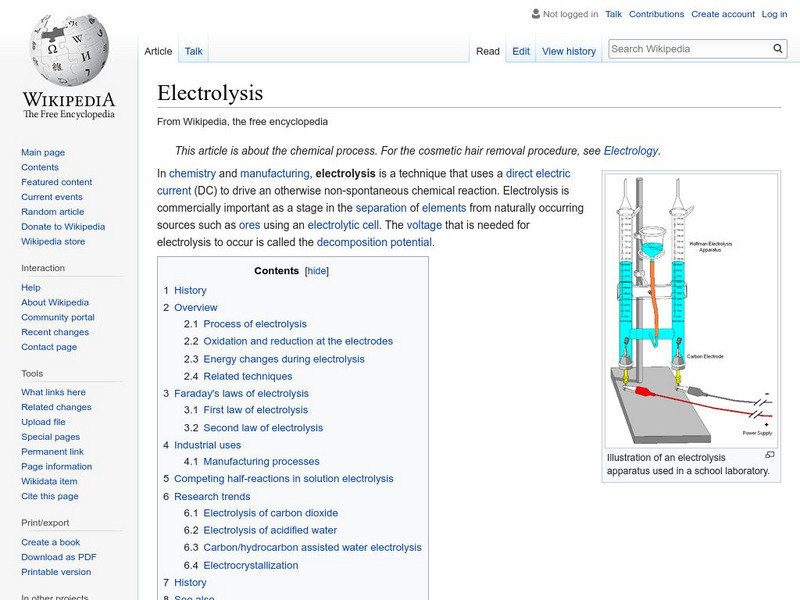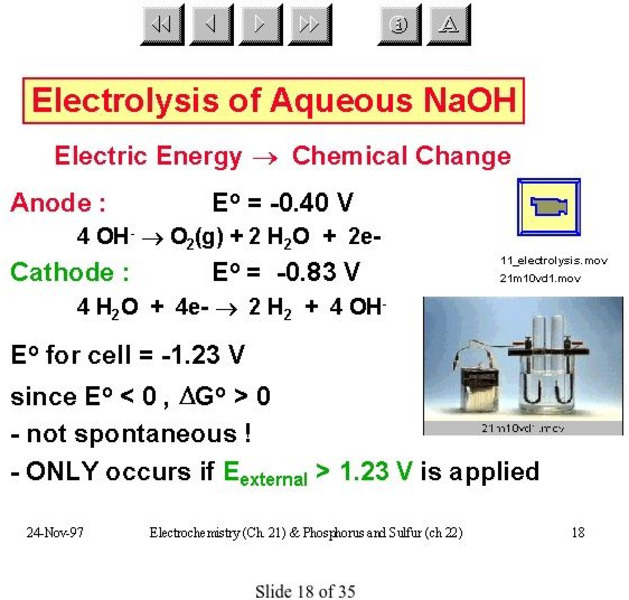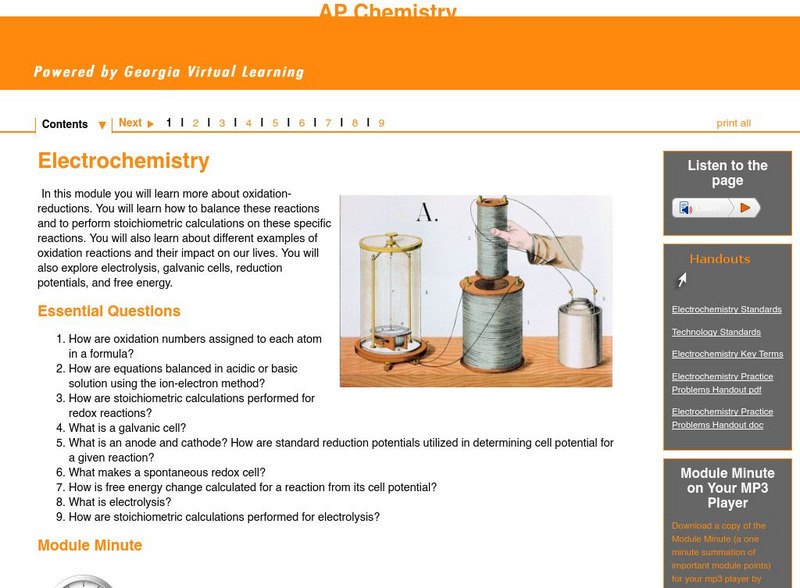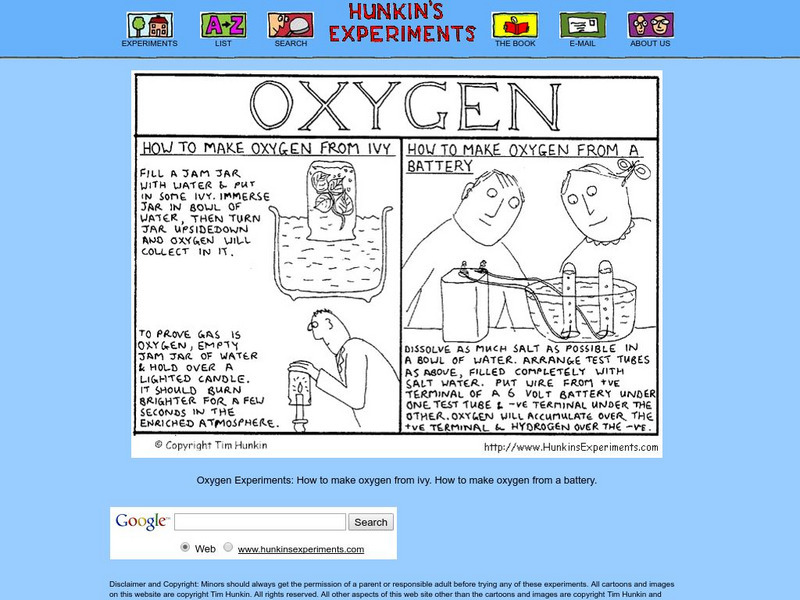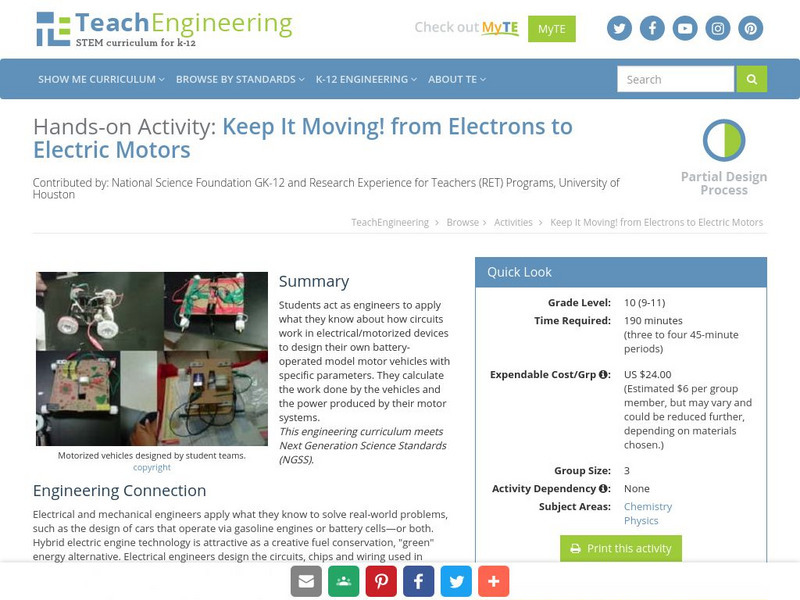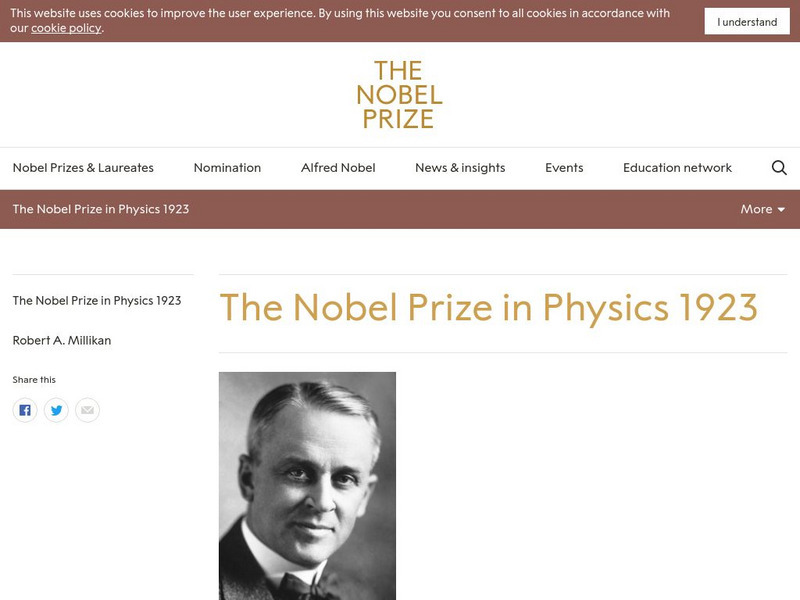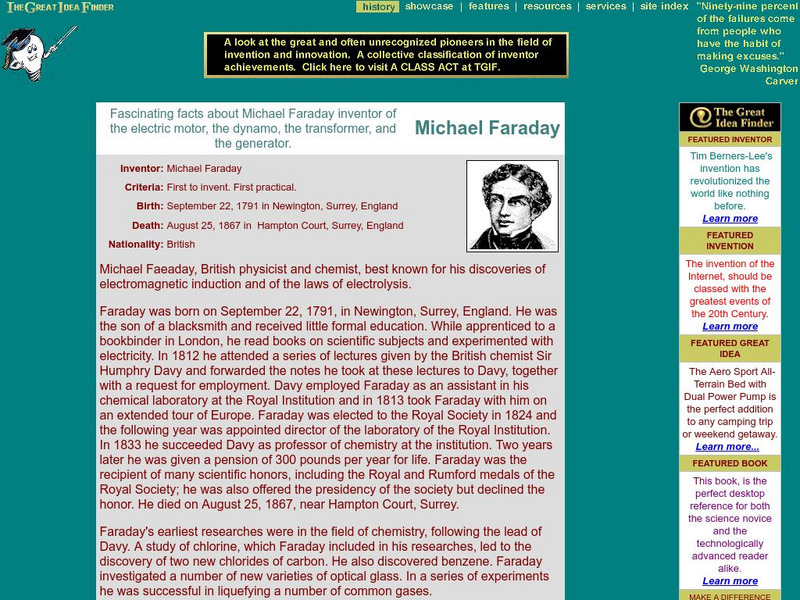Texas Instruments
Texas Instruments: Electrolysis of Water
Students will learn to write the half reactions that occur at each electrode during the electrolysis of water, performed in microscale using a 9V battery as a power source. In monitoring the pH at each electrode, studens will learn that...
BBC
Bbc: Gcse Bitesize: Electrolysis
This lesson focuses on Electrolysis, the decomposition of a liquid using electricity. When ionic compounds are molten or dissolved in water the ions are free to move. It offers links to a video and a test.
Wikimedia
Wikipedia: Electrolysis
Wikipedia offers a short explanation of the how the electrolysis process works with links to some of the scientific pioneers of electrolysis.
Other
Miniscience: Electrolysis of Water
A simple science project designed to investigate electrolysis of water in a laboratory.
McMaster University
Mc Master University: Electrolysis of Aqueous Na Oh
Experimental setup and energy requirements for electrolysis of sodium hydroxide solution.
Georgia Department of Education
Ga Virtual Learning: Ap Chemistry: Electrochemistry
In this module students learn more about oxidation-reductions and how to balance these reactions and perform stoichiometric calculations on these specific reactions. Students also explore electrolysis, galvanic cells, reduction...
Concord Consortium
Concord Consortium: How Can a Small Spark Start a Huge Explosion?
In this Activity 1 investigates What makes materials different from each other? Students will continue to learn about energy and to investigate how energy changes relate to changes in matter. Students will also explore what makes...
Hunkins Experiments
Hunkin's Experiments: How to Make Oxygen From a Battery
Hunkin's Experiments is a group of simple cartoon illustrations of scientific principles. Some would work well in the classroom, but others have little value beyond entertaining students. All of the projects are easy to do. This one...
Chiral Publishing
Chiral Publishing: An Introduction to Chemistry: Voltaic Cells: Audio Book
Listen and learn how the battery converts energy using voltaic cells. Learn how anodes and cathodes aid in oxidation and reduction. Discover how voltage and electrolysis direct the current.
MadSci Network
Mad Scientist Network: Nonproduction of Oxygen
From the Mad Scientist Network, this page (and its accompanying answer page) use a question and answer format to help explain the results of an electrolysis of water experiment. Helpful tips for performing such an experiment are given.
University of Minnesota
University of Minnesota: Ships: Science & Religion of Michael Faraday
Here's a whole different look at Faraday. His religion, Sandemanian, greatly influenced both his life and his science. This article looks deeply at that aspect of his life.
TeachEngineering
Teach Engineering: Keep It Moving! From Electrons to Electric Motors
Students act as engineers to apply what they know about how circuits work in electrical/motorized devices to design their own battery-operated model motor vehicles with specific paramaters. They calculate the work done by the vehicles...
Nobel Media AB
The Nobel Prize: The Nobel Prize in Physics 1923: Robert Andrews Millikan
This Nobel website on the life and scientific work of Robert A. Millikan includes a biography, images, and internet resources for further reading and research. Also included are the 1923 "Presentation Speech" which praised Millikan's...
Great Idea Finder
The Great Idea Finder: Michael Faraday
A solid biography of good length and history of Faraday's work. Complete, readable, thorough. Picture. Lots of links to other sources, including Joseph Henry's claim that *he* was first, and another about Faraday's kinetic flashlight!
Concord Consortium
Concord Consortium: Where Does All the Energy in an Explosion Come From?
In this module Activity 3 investigates What changes in energy occur when atoms rearrange during a chemical reaction? This activity explores the relationship between energy and chemical reactions. A bonus reading includes Energy and...
Concord Consortium
Concord Consortium: What Happens to the Energy of Water Molecules During Hurricanes?
Activity 2 investigates How Hot Can Water Get? In Activity 2 students analyze the relationship between energy changes and phrase changes as they discuss what happens when water boils. Bonus reading includes Why is Temperature Constant...
Other
The Science House: Production of Hydrogen
In this experiment, students generate hydrogen gas and examine its properties. Teacher's notes are included.
Curated OER
Educational Technology Clearinghouse: Clip Art Etc: Michael Faraday
(1791-1867) British scientist, chemist, physicist, and philosopher who greatly contributed to the fields of electromagnetism and electrochemistry. His main discoveries include the magnet field, electromagnetic induction, diamagnetism,...
Other
Case Western Reserve Univ.: Electrochemistry Dictionary
Dictionary containing definitions of words and phrases used in electrochemistry.
ClassFlow
Class Flow: Reaction Types
[Free Registration/Login Required] Students cover the five general types of chemical reactions: synthesis, decomposition, combustion, single-displacement, and double-displacement. The flipchart concludes covering the reactions as the...
Other popular searches
- Electrolysis of Water
- Electrolysis Copper
- Catalyst and Electrolysis
- Electrolysis Copper Sulphate
- Chemistry Electrolysis
- Electrolysis Water
- Experiment Electrolysis
- Electrolysis Lab
- Hoffman Electrolysis
- Hofmann Electrolysis
- Electrolysis of Copper
- Electrolysis of Aluminium


